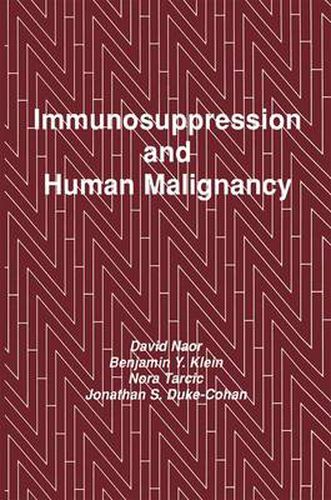Readings Newsletter
Become a Readings Member to make your shopping experience even easier.
Sign in or sign up for free!
You’re not far away from qualifying for FREE standard shipping within Australia
You’ve qualified for FREE standard shipping within Australia
The cart is loading…






This title is printed to order. This book may have been self-published. If so, we cannot guarantee the quality of the content. In the main most books will have gone through the editing process however some may not. We therefore suggest that you be aware of this before ordering this book. If in doubt check either the author or publisher’s details as we are unable to accept any returns unless they are faulty. Please contact us if you have any questions.
This original and incisive new book by Naor and his colleagues Immunosuppression and Human Malignancy offers a state-of- the-art critical analysis of the huge body of recent research on the immunosuppressive states associated with malignancy. Maximum attention is paid to the role of suppressor macrophages and lymphocytes in malignancy-related immunodepression. The central question posed is whether immunosuppression induces carcinogenesis and/or tumor progression or whether it is instead the result of these processes and/or the therapy protocols. Sources of experimental artifacts are also evaluated. Encyclopedically presented each chapter of Immunosuppression and Human Malignancy can be read independently and each chapter features a detailed table summarizing that chapter’s major findings providing the reader with concise material to aid in evaluation. Investigators initiating work in the field will find it an especially valuable reference guide as well as a useful tool in comparing findings published by all the major laboratories in the field. Students of medicine will find novel perspectives complementing the basic information gleaned from lectures and textbooks. Since certain treatment protocols for malignant diseases have already taken into account cause-effect relationships between tumors and immunodepression physicians may also wish to use the book in evaluating their varied treatments or perhaps the potential hazards associated with specific therapies.
$9.00 standard shipping within Australia
FREE standard shipping within Australia for orders over $100.00
Express & International shipping calculated at checkout
This title is printed to order. This book may have been self-published. If so, we cannot guarantee the quality of the content. In the main most books will have gone through the editing process however some may not. We therefore suggest that you be aware of this before ordering this book. If in doubt check either the author or publisher’s details as we are unable to accept any returns unless they are faulty. Please contact us if you have any questions.
This original and incisive new book by Naor and his colleagues Immunosuppression and Human Malignancy offers a state-of- the-art critical analysis of the huge body of recent research on the immunosuppressive states associated with malignancy. Maximum attention is paid to the role of suppressor macrophages and lymphocytes in malignancy-related immunodepression. The central question posed is whether immunosuppression induces carcinogenesis and/or tumor progression or whether it is instead the result of these processes and/or the therapy protocols. Sources of experimental artifacts are also evaluated. Encyclopedically presented each chapter of Immunosuppression and Human Malignancy can be read independently and each chapter features a detailed table summarizing that chapter’s major findings providing the reader with concise material to aid in evaluation. Investigators initiating work in the field will find it an especially valuable reference guide as well as a useful tool in comparing findings published by all the major laboratories in the field. Students of medicine will find novel perspectives complementing the basic information gleaned from lectures and textbooks. Since certain treatment protocols for malignant diseases have already taken into account cause-effect relationships between tumors and immunodepression physicians may also wish to use the book in evaluating their varied treatments or perhaps the potential hazards associated with specific therapies.